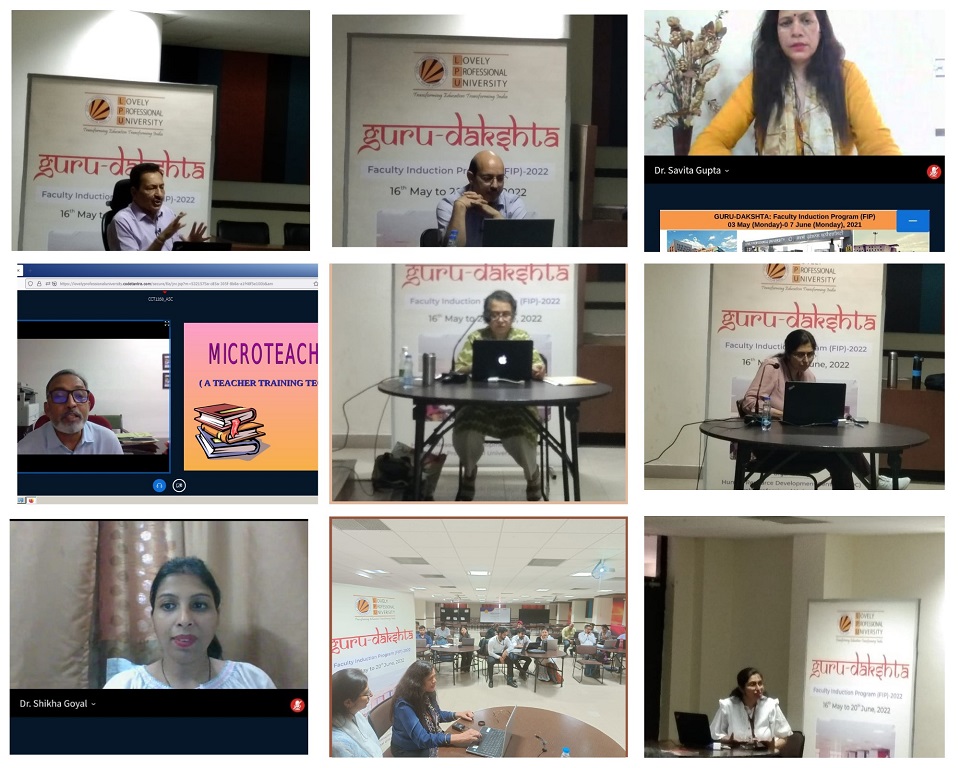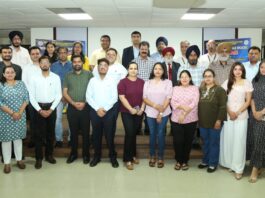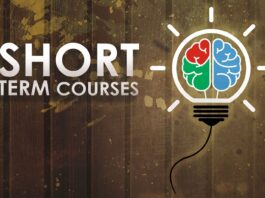Teachers’ competency is important for the process of student ‘well development’ in ensuring quality learning. Teachers’ competency will give positive effects on students’ academic development and skills, and help teachers to improve their teaching techniques. Lovely Professional University- Human Resource Development Center (LPU-HRDC) aims at enhancing the knowledge, skills, and competence of teachers across the campus, supporting them in enhancing their full potential through learning that is job significant and transferable to the workplace. The Guru-Dakshta: Faculty Induction Program has been organized w.e.f. May 16, 2022 to June 20, 2022, for the participants from Higher Educational Institutions PAN India.
Week 3 & 4 of Guru-Dakshta: Faculty Induction Program (FIP) were structured as per Module IV, V and VI prescribed in UGC Guidelines, 2019 in Guru-Dakshta manual. Hence the sessions targeted:
- Module 4: Teaching, Learning and Assessment
- Module 5: Technology for Teaching and assessment of I-generation
- Module 6: Personal-Emotional Development and Counselling
The fourth module titled “Teaching, Learning and Assessment” As assessment is a critical aspect of teaching and learning process which aim at collecting, interpreting and analyzing the students’ performance. The quality of learning is determined by the quality of assessment practices in the classroom aiming at this a comprehensive overview of how to enable teachers to equip themselves with high quality teaching, learning and assessment series of sessions were conducted in which Prof. Dr. Sanjay Modi, Pro-Vice Chancellor, Lovely Professional Universitydeliberated upon the Cultivation of Higher Order Thinking Skills (HOTS) using real-world scenario.
Dr. Ravinder Kumar Soni, Adviser-II, AICTE revealed the paradigm shift in academic ecosystem of Higher Education Institutions with reference to National Education Policy 2020.
Dr. Pavitar Prakash Singh, Professor and Dean, Lovely Professional University explained Effective Classroom Management. He elaborated on the DNA of Dynamic Learning, Impactful & Innovative Opening & Closing of Lectures, Effective Use of Polarizers and generation of WOW Moments.
Dr. Savita Gupta, Professor, HRDC, Lovely Professional University focussed on Andragogy: Dealing with Adult Learners. Dr. Gupta deliberated on the learning styles of adult learners as per Kolb, dealing with Adult Learners Effectively, developing an understanding of Andragogy and Understand about Heutagogy. She also focussed on Multicultural Classrooms and Inclusive Pedagogies with Every learner unique: Activity, ABC of Inclusive Education and Cooperative and Collaborative Learning techniques.
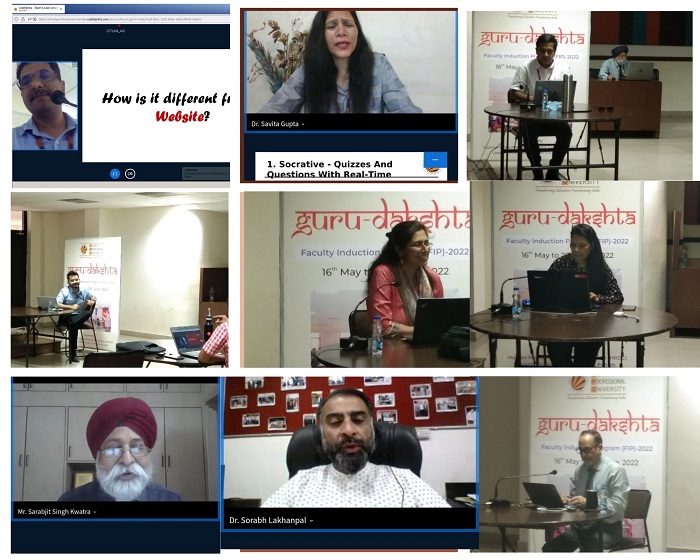
Dr. Rajesh Verma, Professor & Senior Dean, Mittal School of Business, Lovely Professional University focussed upon:
- Case Based Teaching
- Publication of Case Studies
- Understand how to write a Case Study
with an outcome to understand the nuances of case method of teaching and publishing a Case Study. Case study as a part of activity-based teaching method was shared amongst the participants.
Dr. Sunaina Ahuja, Professor and Dean, Head-HRDC, Lovely Professional University focussedon
- Student-Centred Pedagogies
- How to re-design the learning experience for my students?
- Principles and methods of Learner Centered Teaching
Dr. Ahuja also oriented the participants on Development of Tools for Objective Assessment and Design of Multiple Choice Questions to assess students on various levels of Bloom’s Taxonomy.
Dr. Amit Kauts, Professor, Head and Dean Faculty of Education, Guru Nanak Dev University, Amritsar, deliberated onMicro Teaching Techniques specifically “Skill of stimulus Variation”.
Dr. Lovi Raj Gupta, Pro-Vice Chancellor, Lovely Professional University focussed on:
- Assessment and Evaluation with real time examples
- Assessment as, for, of and of V/s for
- The paradigmatic shift
- Assessment: Class to Glass
- Quick Exercises
Dr. Shikha Goyal, Associate professor, Mittal School of Business, Lovely Professional University focussed on Innovations in Classroom Assessment Techniques, Assessment of Student Learning, Measuring the progress of Student Learning and Assessment types and techniques.
The fifth module titled “Technology for Teaching and assessment of I-generation” provided essential knowledge on the use of potential of technology in teaching and assessment, to understand and appreciate the potential of technology in teaching-learning process. Dr. Lovi Raj Gupta, Pro-Vice Chancellor, Lovely Professional University focussed on:
- Blended Learning
- Synchronous Vs Asynchronous learning
- Framework of creating right blend
Dr. Parteek Bhatia, Associate Professor, Department of CSE, Thapar Institute of Engineering & Technology, Patiala deliberated on the Flipped Classroom and E-content Development for Flipped Classroom. He provided a comprehensive picture of global developments in usage of this teaching technique, elaborating upon the new role of teachers and the learners employing the Flipped teaching model. He conducted Hands-on Session on user friendly technologies for e-content development using Adobe Presenter.
Dr. Tejinderpal Singh, Associate Professor, University Business School, Panjab University, Chandigarh oriented the participants on usage of Open Digital Educational Tools for Interactive Online Teaching and Learning using various platforms namely Flubaroo, Edmodo, Jamboard, Nearpod, etc. The participants relished experiential learning on these platforms, helping them to overcome the biggest challenge of online teaching viz. making it a two-way interaction rather than a monologue.
Dr. Savita Gupta, Professor and Head Deptt. of Faculty Development, HRDC, Lovely Professional University oriented the participants on ICT based Classroom Assessment Tools specifically on Mentimeter, Meet Socrative, Kahoot, Quizzes and Poll Everywhere. The participants were curious to learn the usage of these techniques, which would help a teacher gamify the teaching by usage of leader boards in classroom assessment.
Dr. Lovi Raj Gupta, Pro-Vice Chancellor, Lovely Professional University and Dr. Sunaina Ahuja, Professor and Dean, Head-HRDC, Lovely Professional University deliberated on the Art of Virtual Teaching and engaged the participants in varied activities. Major focus was on:
- Comparison of Traditional Classroom with Virtual Classroom
- Case Study on Designing an effective lesson
- To arrive at a common understanding of Communication Strategy for Effective Virtual Teaching
- Tips for mastering the Art of Virtual Teaching
Mr. Amandeep Singh, Asst. Professor & Asst. Dean, Division of Academic Affairs Lovely Professional University disseminated on Collaborative Learning Creating Blogs, Blogging Platforms. He discussed innovative ways of using blogging as a technique for enhancing students’ reading skills and creative writing.
Dr. Savita Gupta, Professor and Head Deptt. of Faculty Development, HRDC, Lovely Professional University oriented the participants on Simulation and Virtual Reality Based Learning placing emphasis on varied technologies used in VR and application of VR in Education.
Dr. Sunaina Ahuja, Professor and Dean-HRDC, Lovely Professional University and Dr. Savita Gupta, Professor and Head Deptt. of Faculty Development, HRDC, Lovely Professional University exchanged their views and experiences on India’s Initiatives in E-learning with key takeaways of the session:
- How can I help my students take advantage of India’s initiatives in e-learning?
- How can I benefit from e-learning platforms?
- How can I contribute to e-learning platforms?
- How can I benefit from international e-learning platforms?
Dr. Rahul Sharma, Associate Professor, Mittal School of Business, Lovely Professional University and Mr. Ajay Chandel, Assistant Professor, Mittal School of Business, Lovely Professional University focussed on Preparation of MOOCs: 4 Quadrant Approach and e-tutorials preparation. He contributed significantly to capacity building w.r.t e-content development for SWAYAM platform, which is a priority area as per the national agenda stated in New Educational Policy 2020.
The sixth module titled “Personal-Emotional Development and Counselling” Personal Social and Emotional Development (PSED) supports students to have a positive sense of themselves, respect for others, social skills, emotional well-being and a positive disposition to learning. So the module Personal-Emotional Development and Counselling targeted strengthening emotional intelligence and counselling skills amongst the participants, a competence which is most required in the prevailing circumstances of combatting the global challenges. This module enabled the participants to enhance their skill of dealing effectively with different types of personality, learn to deal and manage stress among the learners and counsel the learners effectively.
Dr. Mridula Mishra, Professor, Mittal School of Business, Lovely Professional University deliberated on types of Personality and its Assessment, Personality Structure and Personality Theories so as to sensitize the participants w.r.t individual differences in personality, leading to individualized response to stress and coping mechanisms.
Dr. Sunaina Ahuja, Professor and Dean-HRDC, Lovely Professional University gave a comprehensive view of Stress and Time Management. She delved deep into the physiology of stress and discussed coping mechanisms with a very practical approach using experiential learning exercises. She inspired the participants to treat stress as a part of life and handle it effectively by using situation relevant coping strategies in professional and personal lives. She contributed significantly to discussing and applying strategies for prioritization and effective utilization of time, adopting a proactive approach and aiming for excellence. Dr. Ahuja also deliberated on Developing Emotional Intelligence and Work Engagement and Work-Life Balance in Higher Education. She elaborated upon:
- Significance of Emotional Intelligence in present times
- The IMPACT of Emotional Intelligence on the society
- The need for Work-Life Harmony
- 6 ways to achieve work-life harmony
Ms. Malvinder Gill, Dy. Dean, Division of Student Relationship, Lovely Professional University expressed her views on Psychological Well Being: The Lifestyle in New Normal and shared significant tips to help, cope and adjust to the new normal and also oriented the participants on Student Mentoring Skills and Strategies, importance of connecting with people, managing time and ensuring emotional well-being of a student
Dr. Pretty Bhalla, Associate Professor, Mittal School of Business, Lovely Professional University, deliberated upon the significant role of counselling in psychological well being and discussed various ways in which participants can help their students deal with psychological challenges especially in the context of combatting the global pandemic.
Prof. Bhupinder Verma, Dean, School of Electronics and Electrical Engineering, Lovely Professional University deliberated on Nurturing Academic Leadership skills for Academic Excellence. He cited case studies on the role of a leader in unleashing the potential of the team, leading to performance above the benchmarks. The participants were engaged by way of discussion and brainstorming to challenge the status quo and adapt to the new normal of leadership.
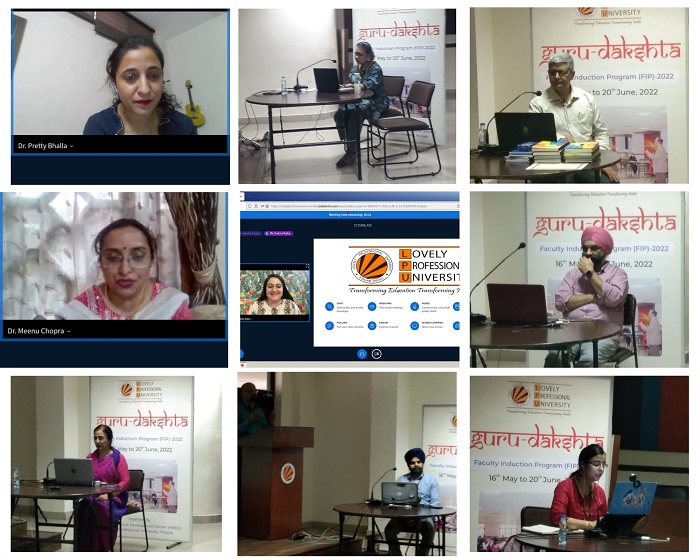
Dr. Lovi Raj Gupta, Pro-Vice Chancellor, Lovely Professional University focussed on Development of Critical Thinking Skills specifically elaborating upon:
- Determine the importance and relevance of arguments and ideas
- How to understand the links between ideas?
- Recognise, build and appraise arguments.
- Identify inconsistencies and errors in reasoning.
- Approach problems in a consistent and systematic way.
In the culminating session of this week, Dr. Sorabh Lakhanpal, Professor and Senior Dean, Division of Student Welfare, Lovely Professional University sensitized the participants on Handling Student Diversity by taking it as an asset that leads to synergy. He illustrated benchmarked practices of Learning Beyond the Classroom through cultural activities, sports and fitness, community service, student organization and clubs, student entrepreneurship, educational tie-ups and skill development. He shared his vast experience of dealing with student bodies in India and abroad. He coached the participants to capitalize upon student diversity by identification of their strengths, sparking teamwork and leadership abilities during campus life, thus nurturing responsible global citizens with holistic personalities.
Ms Saloni Kalra, Art of Living Faculty, State Teacher Coordinator of Punjab and Chandigarh and Mr. Vivek Vansal, Art of Living Faculty, State Teacher Coordinator of Punjab and Chandigarh focussed on highly effective educational and self-development programs and tools that facilitate the elimination of stress. To foster deep and profound inner peace, happiness, and well-being for all individuals.
Mr. Mahesh Dogra, President, Divine Wellness Center, Jalandhar deliberated on Life Skills for Sustainable Future encompassing a broad range of personal, interpersonal, psychological, social and cognitive skills
During Week 1 and 2 the participants were regularly provided the reading material relevant to the program curriculum and FIP sessions. As a part of the FIP assessment scheme, the participants were assigned 3 projects namely
- Project 1: Prepare an Extended Abstract on any research topic of your interest as per template provided. Parameters of assessment in the form of Rubric were also shared.
- Project 2: The participants made presentations of the key learning from previous day sessions and same was assessed on the parameters of content, presentation and application of key learning outcomes in the classroom by the Resource Panel.
- Project 3: was also assigned in the 2 week and submission was scheduled in the week 4 wherein participants were required to choose a course curriculum that they have already taught. Share their feedback on the course review format shared with them. Redesigning of the course curriculum by defining the course learning outcomes and course contents as per the principles of Outcome Based Curriculum Design was to submitted in the form of PPT as per the template provided.
Throughout Week 3 and 4 of the GURU-DAKSHTA FACULTY INDUCTION PROGRAM, the SMEs used Collaborative learning methods like Case studies, videos, discussion, quizzes, and story-telling. Weekly feedback was sought from the participants for each session, the same was analyzed by the Program Coordinators and shared with the concerned Resource Persons. The feedback analysis revealed the participants were delighted with the organization of GURU-DAKSHTA FACULTY INDUCTION PROGRAM by Lovely Professional University-Human Resource Development Center. They strongly agreed that the program was well structured, relevant in terms of content, exposed them to new knowledge and practices and their queries were responded to well by the Subject Matter Experts. LPU MyClass Platform gave an interactive learning environment, and access to video recordings of the sessions and study material.

